How ‘Mrs. Davis’ Staged a Super Bowl Commercial With Fake Nuns and the Holy Grail
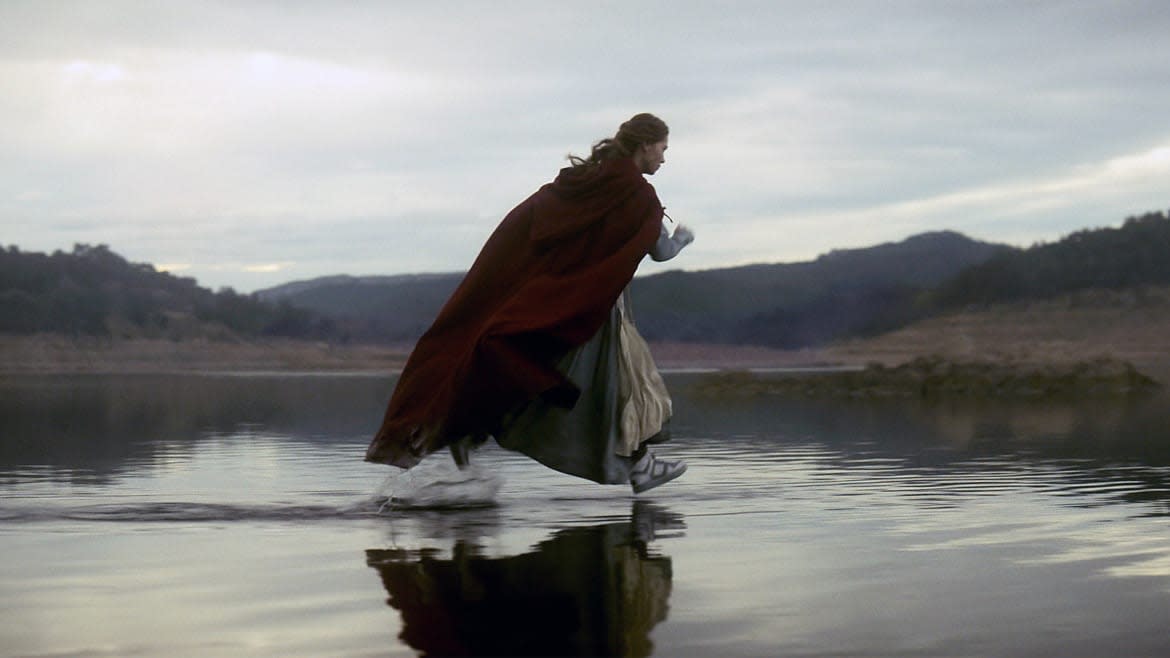
Imagine how hard it is to fund, conceptualize, and shoot a commercial slot in the Super Bowl. That can’t be easy. Now, throw in a batch of cult members posing as nuns, a fake product in the spotlight, and the Holy Grail—sounds a whole lot trickier, right?
It was a feat that director Owen Harris (Black Mirror) was willing to pull off for Mrs. Davis, Peacock’s new, twisty sci-fi series about a (real) nun, Simone (Betty Gilpin), who’s trying to find the Holy Grail, in order to defeat an AI overlord known as Mrs. Davis, a sentient robot who speaks to the human world through an earpiece. Each episode of Mrs. Davis is even more creative and bonkers than the last—and that’s no different with this week’s fifth installment, “A Great Place to Drink to Gain Control of Your Drink,” which sees the Grail on a warped film set, murdering a poor girl, and ultimately, ending up in a whale’s belly.
The Dizzying ‘Mrs. Davis’ Refuses to Settle for Simple Weirdness
“It’s not easy to sell a show like this. It’s not easy to convince people that it’s going to work,” Harris tells The Daily Beast’s Obsessed over Zoom. “It’s a real plus, being involved in something that will hopefully give the industry confidence to take these big swings and get behind invention and originality.”
Below, Harris digs into Episode 5, from Mathilde (Katja Herbers) and Clara’s (Mathilde Ollivier) messed up mother-daughter relationship and Simone’s connection to them, to using Amélie as an inspiration and why AI couldn’t write a show like Mrs. Davis.
(Warning: Spoilers ahead for the most recent episode of Mrs. Davis.)
How did you get involved with Mrs. Davis?
I was sent the script by my agent. I read it and almost immediately wrote back to him and said, “What the fuck have I just read?” Literally within a second I thought, “Hang on, that’s going to sound really bad.” So I immediately emailed him again and said, “But I really want to do it.” I just loved it. I was struck by its originality, but most importantly, its bravery.
It was also towards the tail end of the pandemic. I felt like the world was doing a much better job of dystopia than anything you could dramatize. It felt like it’d be really lovely to do something that had a fresh and optimistic heartbeat to it. My response [to the script] was, “Wow. How do you do this? It’s going to be really challenging.” But that’s what gets you up in the morning, to try and figure that out.
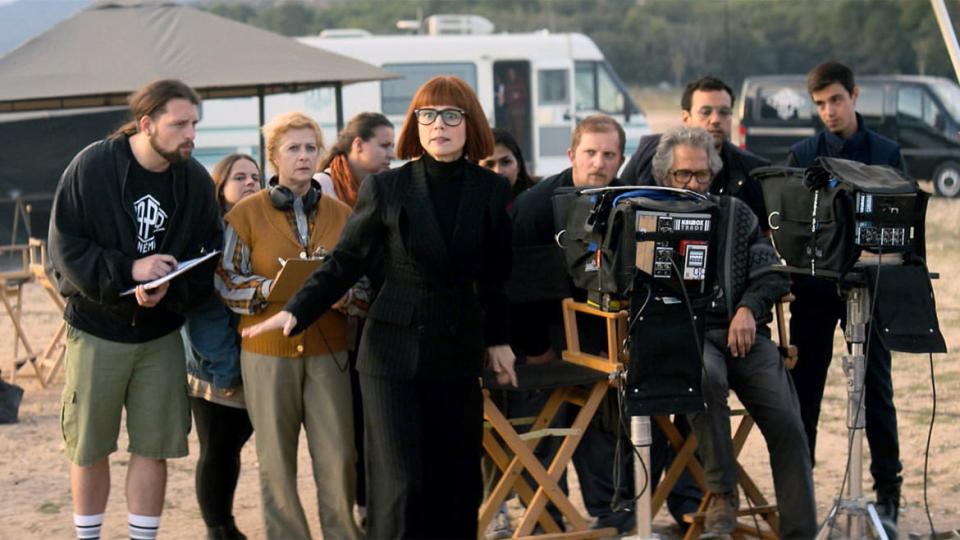
Katja Herbers as Mathilde.
In Episode 5, we learn that the show’s opening scene in the pilot was actually a shoe commercial, shot to show off the Holy Grail. Did you have to reshoot that scene for this episode?
Yeah. I shot the pilot, so whilst we were shooting the opening of the pilot, we were also in tandem shooting the behind-the-scenes of [Episode 5]. It made for a really complex shoot. As [we] were shooting a shot that was going to go in a pilot, we would have other cameras set up to shoot the bits that would be behind the scenes. We’d actually have to bring in background artists to play the crew operating those cameras on-camera, along with some of our own crew, who’d agreed to be on screen.
It’s quite a complex operation to try and run the two things, but it created a really nice energy for the behind-the-scenes [shots], because it was real. All the mess of what goes into making a film was there. The little flashes you get behind the scenes were the behind the scenes of our actual shoot. It gets even more meta as you get into how we shot it. At one point, there were two directors on set, me and Katja.
Betty Gilpin Was Born to Play a Badass Nun Who Makes Out With Jesus
Can you give me more details on the role of the Holy Grail here, since we see it so much in this episode? How were its powers conceptualized?
The Grail actually having a behavior and being slightly childlike in its behavior is something I thought was really fun—but also, being powerful and something you obsess about. [This characterization] was a playful way of dealing with something that is ultimately both a myth and a legend, depending on how you feel about things like the Holy Grail. It found that balance really well. The way it dealt with obsessions, and how that affected Mathilde and Clara’s mother-daughter relationship, that was really fascinating.
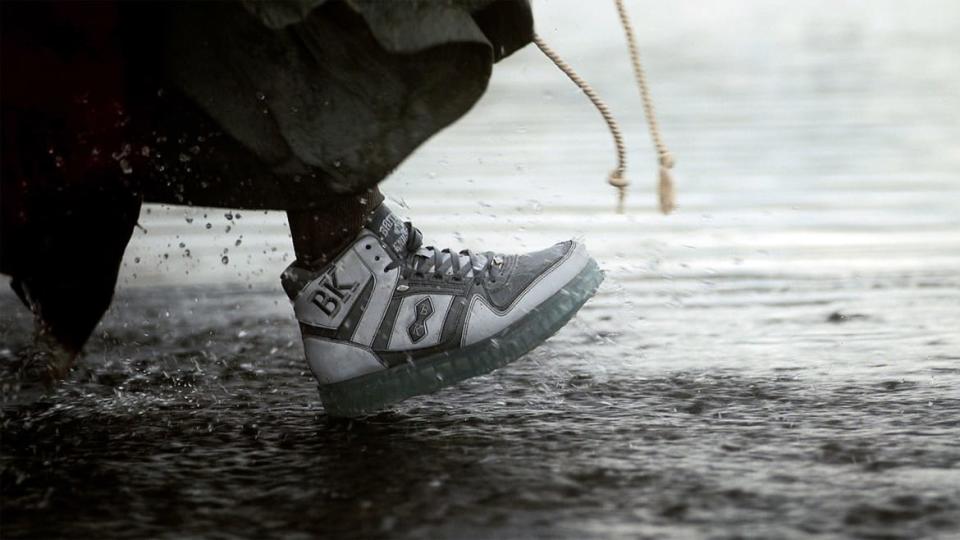
Mathilde Ollivier as Clara in Mrs. Davis.
Simone has a vision of Clara when she’s making the decision to enter the belly of the whale at the end of this episode—Clara seems to be the reason she ultimately says yes to the journey. What’s going through Simone’s mind?
We’ve all got Holy Grails in our lives. Whether they’re our careers or whatever, our little obsessions are our distractions. When it comes to a mother-daughter relationship, where there’s a tussle between what the child wants and what the parent’s able to give them—in terms of their affection and their focus and the quality of their time—that’s the obvious parallel between Clara and Mathilde. We heighten it, because we’re dealing with the Holy Grail. But if you look at it in terms of a mother-daughter relationship, we realize that we all have these obsessions and these distractions, and as children, we have needs. In a way, the parallel is just meant to be a sense of a nagging feeling Simone has within her. It’s something that has clearly troubled her throughout her life. In a funny way, by being told this story, it’s almost like being retold her own story and what the consequences could be.
What inspired your direction of the episode?
For Episode 5, we’re doing this story within a story. We already have Mrs. Davis, which is slightly heightened. We try to ground it, but it’s deliberately got a slightly heightened sensibility to it. We’ve got to decide how we differentiate and how to give that its own feel. Because [the episode] was set in France, I immediately thought, “Why not just have a bit of fun and give it a slight Amélie sensibility?” [That influence is] what makes [the episode] feel strangely nostalgic, in a way, because what you’re referencing are fantastic things that we all loved and carried with us into these productions.
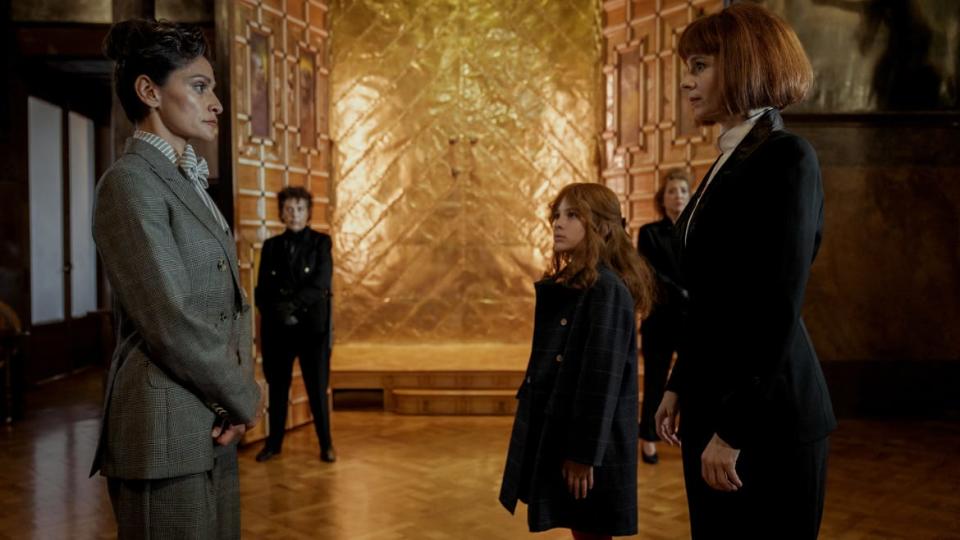
(L-R) Executive, Alba Lasserre as Young Clara and Katja Herbers as Mathilde.
Clara and Mathilde’s backstory, and the story of the Holy Grail, that was the biggest reference we used, so you felt like someone was turning the pages of a book. It felt like each frame had its own stylized feel to it. It’s a lot about channeling what they’re bringing emotionally to the piece, and then making that reflect what’s going on in the Clara story. [Simone] is sitting down at a campfire with tiny little moments of reflection. The mother-daughter story was the connection I was interested in, [making] those two stories connect.
The Year the Nuns and the Gays Took Over SXSW
Was it hard to keep track of so many characters’ backstories?
You have to recalibrate every time a new script comes out. Every time they did a draft of the storyline, it’s raw, so you’re trying to piece it all together. But what makes it almost easier to remember [is] when a fact is curious or strange, it sticks within your head more. It’s the trick of this storytelling. It gives you moments of absurdity. By the end of it, strangely, you’re not sitting there thinking, “Who is this character? What do they have?” You feel like you’ve been led by the hand to this conclusion that maybe you were, maybe you weren’t expecting—but either way, you feel satisfied when you get there.
You worked on Black Mirror, too. Where do you think your experience with that dystopian show intersects with your work on Mrs. Davis?
[Black Mirror and Mrs. Davis] are about viewing the world we live in, but through a skewed lens. They both use different techniques. Black Mirror changes its approach episode to episode about how you’re viewing a certain subject or a certain aspect of our lives. Mrs Davis did the same, with overarching broad themes in spirituality, religion, technology—things we’re all interested in because they affect our lives so much.
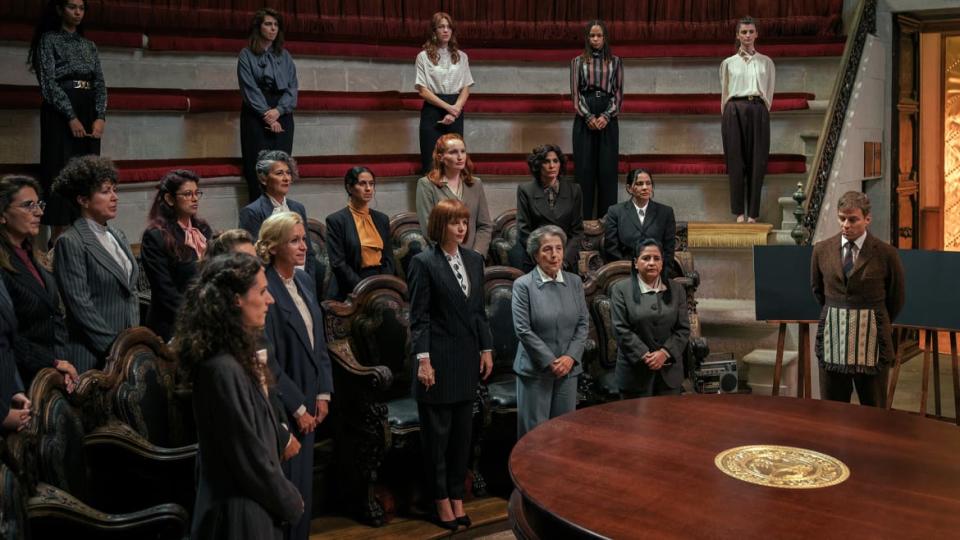
Katja Herbers as Mathilde.
In particular, the Black Mirror [episodes] I worked on, what I loved about them was that they managed to marry that with real soulfulness and intimacy and a sense of character. It’s really fun when you can do high-concept stuff where you also care—certainly with sci-fi, which can often be quite cold. It had a real warmth to it. Those are the stories I’m drawn to, and that’s how there are parallels to Black Mirror. I also think that they’re shows that don’t necessarily try to answer any questions. They open up things. They mess with your head a bit.
Some folks in the entertainment industry have talked about potentially using AI to create movies. Could an AI like Mrs. Davis write a show like Mrs. Davis?
I’d like to think no! What I think AI will always struggle with—and this is a big statement because I’ll probably get proved wrong tomorrow—is nuance and a human ability to be playful with facts. You can mimic things, but there’s something slightly sociopathic about mimicry. When someone writes from a place of care, it’s a very human thing. As humans, we pick up on all of this nuance. We pick up on artificiality and we pick up on sincerity.
I hope AI will remain as a really fantastic tool. It can really help us break ideas and come up with different ways of looking at things. But the true story has always got to be a human one. That’s not to say there’s not going to be an amazing AI film coming out at some point, but I think there will always be room for the human process in storytelling.
Would you test out Mrs. Davis yourself, if you had the opportunity to?
I don’t know! I’m trying to base it on what I do in terms of AI. I’ve used ChatGPT. I’m not on Instagram. I don’t have Siri, but sometimes I chat with my kids on Alexa. But none of those are running the world and offering me wings with hefty prices to pay. I probably wouldn’t use Mrs. Davis. But then that’s just positioning me in a very heroic light, like the hero of our show. Maybe I would, if it made my life easier and it made everyone happy.
It’s not something we try to answer with the show necessarily. I don’t think we’d ever land completely on the fact that we’re dealing with an evil AI. We put a lot of trust and faith into AI, and into technology generally. We’re on a Zoom now! That’s not a bad thing. The very long-winded answer to your question is: I’ve got no idea.
Get the Daily Beast's biggest scoops and scandals delivered right to your inbox. Sign up now.
Stay informed and gain unlimited access to the Daily Beast's unmatched reporting. Subscribe now.

 Yahoo News
Yahoo News 
